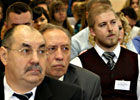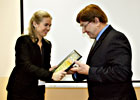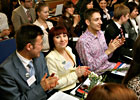|
|
LABOR MIGRATION AND MIGRANT INTEGRATION POLICY IN GERMANY AND RUSSIA
Edited by Marya Rozanova
Published:
St. Petersburg: St. Petersburg State University; Center for Civil, Social, Scientific, and Cultural Initiatives “STRATEGIA,” 2016.
The Book Description:
Increased international immigration creates both challenges and opportunities for host countries. In this volume, the contributors introduce perspectives for future immigration to Russia and Germany. By situating both Russia and Germany in the context of emerging immigration countries, the book is focusing on public governance responses to difficulties related to unprecedented demographic change, labor migration regulation, and immigrant integration. In addition, it addresses escalating migrantophobia and growing right-wing political movements in host societies.
| In English: Free Book Download |
In Russian: Free Book Download |
 |
 |
Volume Contributors:
- Sergey Abashin, a Professor of Migration Anthropology at the European University at St. Petersburg
- Valeriy Achkasov, a Professor of Political Science and the Head of the Department of Ethnopolitology at Saint Petersburg State University
- Jan Cremers, a Senior Researcher at the Amsterdam Institute for Advanced Labour Studies (AIAS), and at the Law School of Tilburg University
- Olga Gulina, a Director of the RUSMPI–Russian Institute on Migration Policy
- Freidrich Heckmann, a Professor Emeritus of Sociology and Director of the european forum for migration studies (efms) at the University of Bamberg
- Hans Dietrich von Loeffelholz, a former Chief Economist of the German Federal Office for Migration and Refugees
- Vladimir Malakhov, a Director of the Center for Political Theory and Applied Political Science at the Russian Academy of National Economy and Public Administration (RANEPA)
- Vladimir Mukomel, Head of the Sector of Migration and Integration Processes Studies at the Institute of Sociology, the Russian Academy of Sciences
- Ferry Pausch, a Managing Director for the German Foundation for Integration
- Marya Rozanova, a Professor of Political Science at the Russian State Hydrometeorological University and a Chairperson of the Center for Civil, Social, Scientific, and Cultural Initiatives “STRATEGIA”
- Ingrid Wilkens, Head of the Unit of Integration Research at the Hessen State Ministry of Social Affairs and Integration
The book has been published with the financial support of the Friedrich Ebert Foundation in the Russian Federation and the Center for Civil, Social, Scientific, and Cultural Initiatives “STRATEGIA.”
|
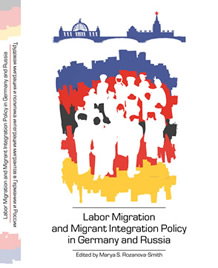 |
 |
|
OPEN ST.PETERSBURG
FOR YOURSELF
(in Russian)
Published by:
St. Petersburg: Center for Civil, Social, Scientific, and Cultural Initiatives “STRATEGIA,” 2011.
Description:
The brochure “Open St. Petersburg for Yourself” is the first publication for the University students who moved to St. Petersburg. The brochure presents the uniqueness of St. Petersburg as a multicultural metropolis and the role of the youth in the city. The chapter “How to Become a Petersburger” highlights the psychological nuances and complexities of the initial stage of adaptation of young people who have recently arrived to St. Petersburg, as well as the principles and rules of multicultural communication. The chapter “Youth St. Petersburg” provides information for students on city resources, highlights on interesting youth projects and activities in sports, arts, and culture, as well as information on the youth programs of the St. Petersburg Committee for Youth Policy, and much more.
Contributors:
- Sergey Akopov, PhD in Political Science, an Associate Professor at the Russian Presidential Academy of National Economy
and Public Administration
- Galina Bardier, Doctor of Psychology, a Professor of Psychology at the Admiral Makarov State Maritime Academy
- Roman Boyarkov, a Professor Assistant of Political Science at the Higher School of Economics
- Andrey Gretsov, PhD in Psychology, an Associate Professor at the Herzen State Pedagogical University of Russia
- Igor Klyukanov, Doctor of Philology, a Professor of Communication at the Eastern Washington University
- Ludmila Pochebut, Doctor of Psychology, a Professor of Social Psychology at the St. Petersburg State University
- Marya Rozanova, PhD in Philosophy, a Director of the Center for Intercultural Dialogue and Socio-Cultural Integration
at the Admiral Makarov State Maritime Academy
- Galina Sinekopova, PhD in Philology, a Professor of Communication at the Eastern Washington University
| In Russian: Free Book Download |
 |
|
 |
 |
IDENTITIES IN THE ERA OF GLOBAL MIGRATIONS
(in Russian)
Authors:
Sergey Akopov & Marya Rozanova
Published by:
St. Petersburg: DEAN, 2016
Book Description:
The “identity” category in the modern political discourse has become a double-edged experience. In this book we share some of the constructivists vs. essentialists views on ethnic/national identity. In this respect we consider national identity as a frequent tool of political manipulation and nationalism driven acts such as terrorism and ethno-religious enmity. The abstract ideas of tolerance, democracy and human rights as alternative political narratives can hardly replace an “enemy” image based type of political mobilization.
In search off ways to make human identity more flexible and less liable to phobias, including xenophobia we try to escape “the measles of nationalism.” In this context, the key characteristics of the new type of personality can be described in terms of 1) “transnationalism” - a social belonging of individuals and groups not to primarily one particular place (state) but to several, and 2) “cultural creolization” – mutual influence between two or several groups, creating an ongoing dynamic interchange of symbols and practices.
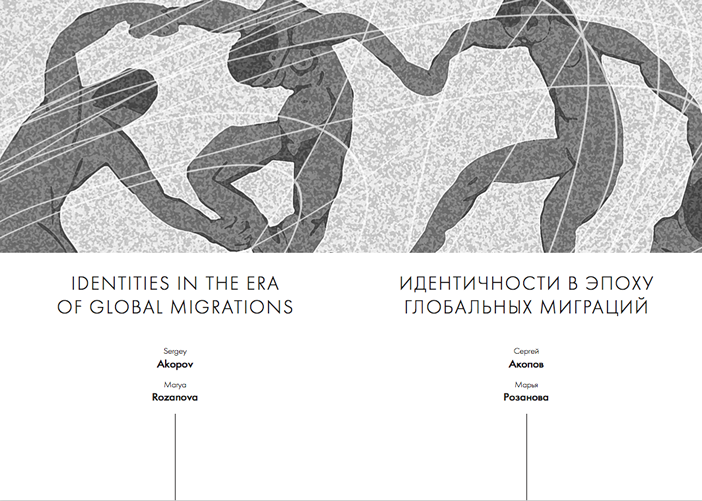 |
The authors show how Russia's identity has transformed and consequently became more fragmental and more national than both the former “imperialist” and the Soviet USSR identities. While some regions after the fall of the USSR remained almost purely homogeneous, others - in contrast - faced rapidly changing ethnic/cultural diversity. These are mostly urban areas (like Moscow and St. Petersburg) that became the magnets for most of immigrants/migrants from the former Soviet republics, mainly populated by Muslims. The proliferation of the new forming “Diasporas” in Russia for the last almost two decades has demonstrated their growing viability and visibility. The influence of these Diasporas on the social and economic life of their host country is growing every day. The Russian host community on their part demonstrates high level of intolerance towards not just these groups of newcomers but to any kind of ‘otherness.’ All these controversies create unprecedented risks and conflicts under the conditions of strengthening of migratory flows, decline of the density of Russian population, and the lack of the real public migration policy. A fragmentation of Russian society occurs as the result of the lack of common political and social values, leading to a revival of racist and nationalistic ideology, and the growth of extremist tendencies.
The authors particularly outline that new cities being the magnets for immigrants are very diverse, fluid, flexible, changeable, and dynamic. This way migration process taking place there cannot be described in terms of narrow assimilation or multicultural theories. Only the combination of elements of the classical and new models of multiculturalism, the concept of communitarianism, old and new models of assimilation can give the positive result.
See more
| In Russian: Free Book Download |
 |
|
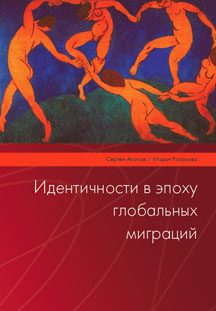 |
 |
WE ARE THE CITIZENS OF RUSSIA - YOUTHS OF INGUSHETIA
(in Russian)
Published by:
Magas - St. Petersburg: Center for Civil, Social, Scientific, and Cultural Initiatives “STRATEGIA,” 2011.
The Book Contributors:
- Marya Rozanova, a Chairperson of the Center for Civil, Social, Scientific, and Cultural Initiatives “STRATEGIA”
- Sergey Akopov, Associate Professor of Political Science at the Northwest Academy of Public Administration
- Zeinep Dzarakhova, a Head of the Department of Ethnography at the Ingush Research Institute of Humanities by Ch. Akhriev
| In Russian: Free Book Download |
 |
|
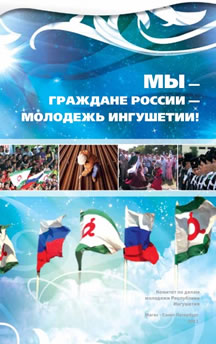 |
 |
LEASING AS AN INSTRUMENT OF INDUSTRIAL ENTERPRISES DEVELOPMENT IN ST. PETERSBURG
(in Russian)
Published by:
St. Petersburg: Center for Civil, Social, Scientific, and Cultural Initiatives “STRATEGIA,” 2008.
Description:
Materials for participants of the Seminar “Leasing as an Instrument for the Economic Growth” for large business organizations
in St. Petersburg (Petro Palace Hotel, St. Petersburg. April, 2008).
|
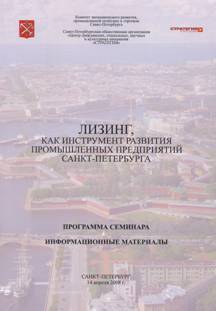 |
 |
INTERCULTURAL DIALOGUE: THE ROLE OF YOUTH THE CONFERENCE PROCEEDINGS
(in Russian)
(in Russian)
Editors: Nemina, V., Boyarkov, R., Pochebut L. & Rozanova, M.
Published by: St. Petersburg: Center for Civil, Social, Scientific and Cultural Initiatives “STRATEGIA,” 2007. P. 48 p.
Description:
This volume combines the proceedings of the Conference “Intercultural Dialogue: The Role of Youth,” held on October 19, 2007, in St. Petersburg, Russia.
The volume is divided into two parts. The first part includes articles written by experts in the sphere of tolerance, interethnic relations and youth extremism negotiation in contemporary Russia. The second part includes socio-political projects/programs by the NGOs and Political Youth Organizations of St. Petersburg.
Contents
Foreword
Lyudmila Pochebut
The Mechanisms for Achieving Inter-Ethnic Dialogue with the Participation of Youth
Galina Bardier
The Problems of Extremism among Youth
Anatoly Kozlov
Petersburg – our Common Home. The Ethnic Composition of Population: Dynamics and Trends
Tamara Smirnova
Creating the Image of the ‘Enemy’ as a Factor in the Development of Extremism and Terrorism
Marya Rozanova & Sergey Akopov
The Results of a Survey on the Situation in the Sphere of Inter-Ethnic Relations
Antuan Arakelian & Olga Gushenevets
Applications. Socio-Political Projects/Programs by the NGOs and Political Youth Organizations
‘Other’ is not a Synonym for ‘Bad’
St. Petersburg Youth Branch of The Russian United Democratic Party “Yabloko”
Festival of Friendship
The Youth branch of the Liberal Democratic Party of Russia
Harmonization of Inter-Ethnic and Inter-Cultural Relations
The Movement Against Illegal Immigration (the St. Petersburg branch)
Lessons of Friendship
The Youth Democratic Anti-Fascist Movement “Nashi”
See more
|
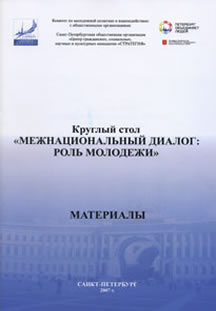 |
|
|

